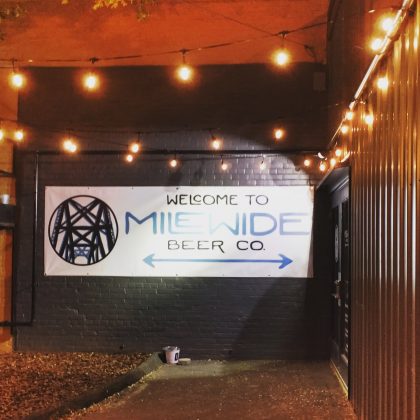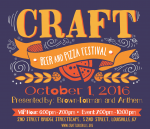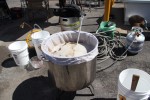Long ago and far away – roughly 1996, according to my increasingly unreliable memory – Anheuser-Busch dipped its bloated toe into mockrobrewing for the very first time, releasing a line called American Originals, and subsequently expanding its Michelob division to include a wheat beer, among others.
All of them eventually sank like the Titanic.
Of course, AB’s uncharacteristic faux-hip behavior during the midpoint of the Clinton administration was calculated as a response to the then exploding microbrewing segment of the market … itself a bubble destined to burst, which led to a substantive rebuilding, and now has grown so pervasive and influential that AB-InBev’s Shock Top knock-off line has become a recurringly tragic component of our daily drinking landscape, along with zombie mercy-killing shelfspace pawns like Trojan Goose.
But let’s forget these transparent modern marketing ploys. The AB mockrobrews of the Nineties were technically impeccable, and just as predictably characterless. They utterly lacked those tiny angles and fringe quirks generally pointing the way to beery creations of genuine excellence, as opposed to those merely proficient and derivative.
Then as now, would you expect otherwise from a practicing megabrewer? After all, the conceptual basis of what we once referred to as microbrewing (and now craft) couldn’t be further removed from that of a multi-national marketing machine’s everyday existence as a supplier of consistent, low-common-denominator commodities to a staid market uninterested in experimentation.
To be sure, the beer market today is unrecognizable when compared to what it was back then. In fact, the American beer world was so utterly different in 1996 that Budweiser still was on tap at the Sportstime Pizza arm of my pub business (though not at the Public House, where we were educating other upcoming cadres), and at the time, the American Originals release struck me as an opportunity to conduct an experiment in social engineering by making a quick switcheroo.
—
One of the American Originals series was Faust, the purported recreation of a 19th-century golden lager, named for a St. Louis restaurateur, and brewed as a house brand for him by pre-1900 AB. I ordered four kegs of Faust from the puzzled wholesaler, yanked the Budweiser, scattered P-O-S materials around the pizzeria, and instructed our employees to pitch the new beer as an AB product just like regular Budweiser, and better than regular Budweiser; furthermore, we were prepared to sell Faust at the very same price point as regular Budweiser even though the cost per keg was higher.
As it turned out, turkeys still couldn’t fly.
Sales of bottled Bud promptly skyrocketed. It took more than a month to sell the first two kegs of Faust, and by the time the third was ready for tapping, the “sell-by” dates already had expired. More confused than ever, the wholesaler bought back the unused kegs.
Brand-loyal Budweiser drinkers wouldn’t touch Faust, even at the same price point, precisely because it wasn’t their totemic Budweiser. Conversely, although it was a good product, and far more interesting a lager than the norm, those aficionados hanging out at Rich O’s wouldn’t drink it, either, because it was suspiciously inexpensive — and emanated from the hated multinational monolith.
—
After a year or so, the grand American Originals mockrobrewing experiment was no more, although some of the brands lived on as part of the Michelob line of beers, which brings me to the point of this digression: During the course of my failed Faustian experiment, there began a correspondence that eventually led to something legitimately earthshaking.
It was a guest appearance at a FOSSILS homebrewing club meeting by the Anheuser-Busch brewmaster who had been placed in charge of the mockrobrewing program by virtue of his previous experience in the microbrewing segment.
He brought A-B mockrobrews to Rich O’s for all to taste, unflinchingly endured the inevitable grilling, answered our questions about his take on the eternal conflict between art and commerce, and earned respect from those in attendance even if most continued to nurse eternal contempt for his employer.
The brewmaster? It was Mitch Steele, and it happened on November 8, 1998.
Soon afterward, Mitch accepted a different position within the corporate leviathan, moving to AB’s facility in Merrimack, New Hampshire. The years passed. Then, in 2006, Mitch shook the whole brewing world by leaving AB and taking a position with Stone Brewing Company, which as we all know is one of the prime exemplars of the methods and attitudes that define craft brewing, setting it apart from commodity brewing.
Mitch Steele was supposed to attend the recent Craft Writing symposium, only to be compelled to cancel owing to an illness in his immediate family. I trust there’ll be another occasion for me to meet him again, because I’d love to know his thoughts on that evening more than 15 years ago, when our paths first crossed.
From 1990 through 2001, I was the writer, publisher, printer and circulation manager for the FOSSILS monthly newsletter, known as Walking the Dog, so named for an anecdote on a bottle of Newcastle Brown Ale explaining that Englishmen would seize upon the exercise needs of their canine companions as an excuse to visit the pub.
Tomorrow, my 1998 Walking the Dog recap of Mitch’s has been unearthed from the archive, to be published right here at LouisvilleBeer.com.





